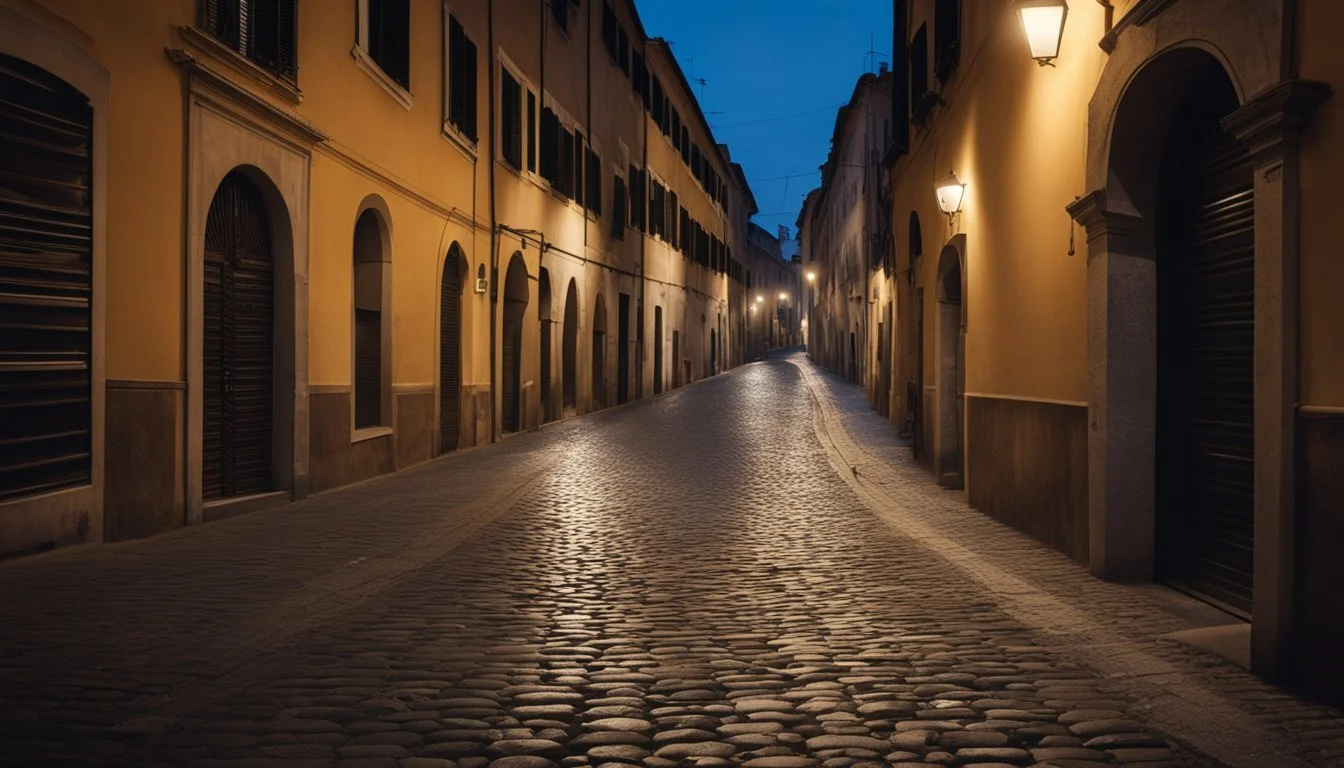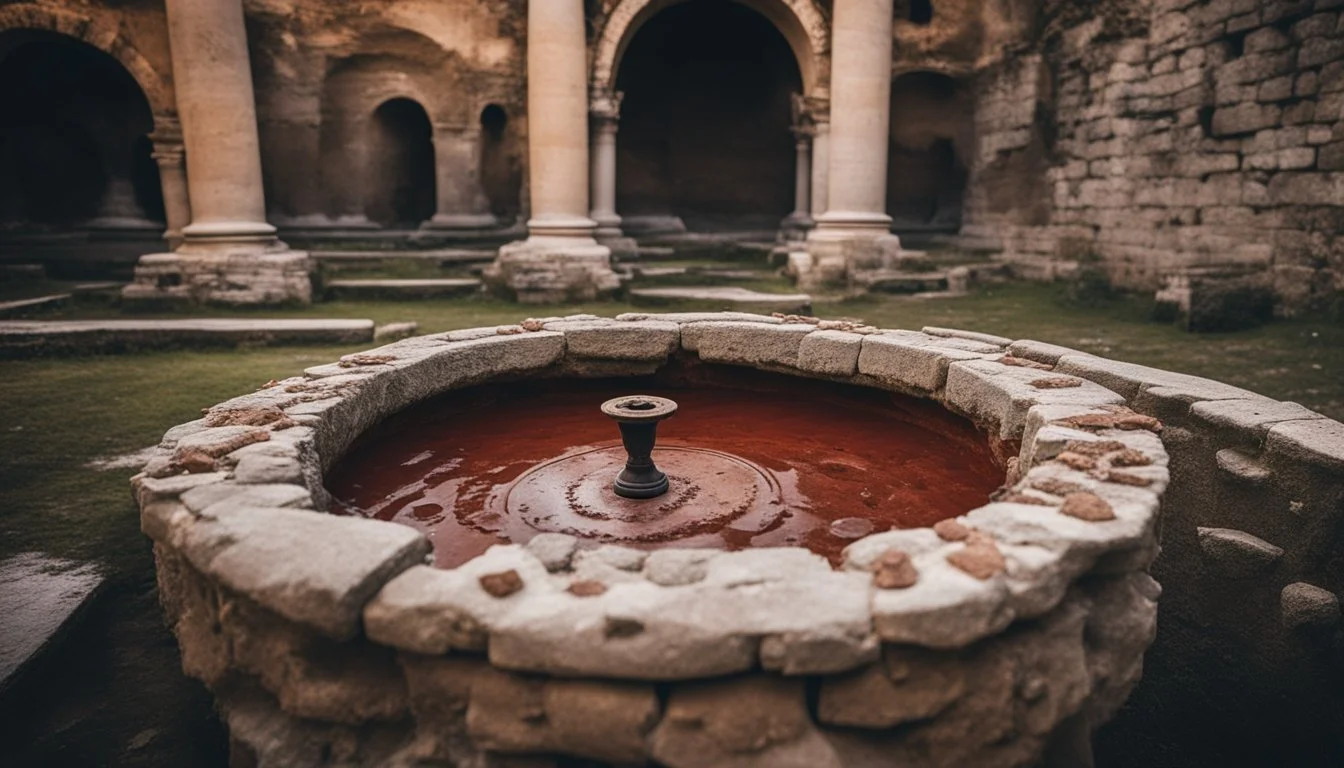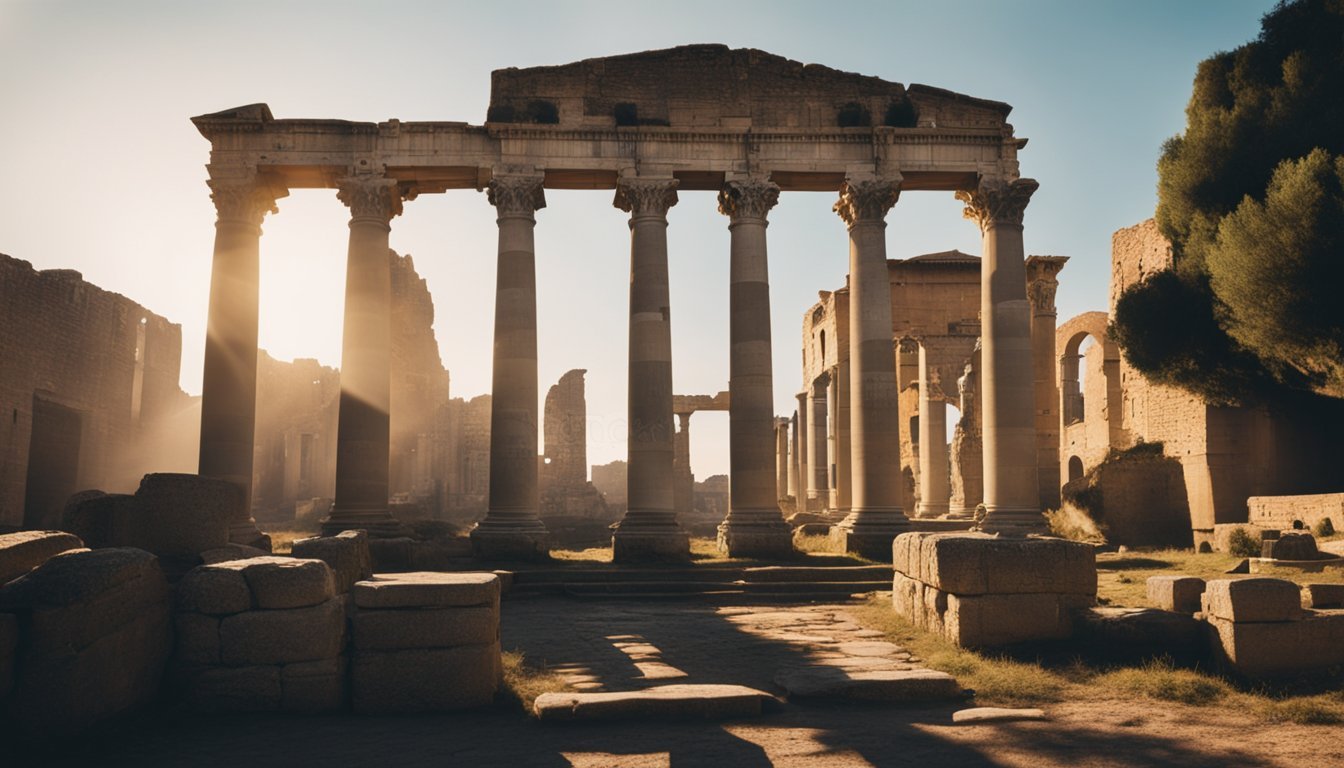8 Intriguing True Crime Documentaries from Rome to Watch Now
True crime documentaries have a unique ability to captivate audiences, merging historical intrigue with the thrilling elements of criminal investigation. Rome, a city steeped in rich history and complex narratives, offers a fascinating backdrop for true crime stories, providing an additional layer of cultural and historical context.
Viewers are drawn to the raw and unfiltered look at Rome's darker past, where political machinations, notorious figures, and unsolved mysteries come to life. With a mix of ancient tales and modern criminal cases, these documentaries reveal the multifaceted nature of crime in the Eternal City, making them both educational and thrilling for enthusiasts of the genre.
1) The Massacre at the Appsul Well (2018)
The Massacre at the Appsul Well (2018) is a documentary that explores the tragic events that unfolded during a mysterious attack in Rome's historic Appsul district.
This film meticulously examines the circumstances leading up to the massacre, highlighting the political and social tensions of the time.
Interviews with survivors and historians provide a first-hand account of the horror experienced on that fateful day. Archival footage and expert analysis help piece together the events, offering viewers a comprehensive look at the incident.
The Appian Way, a focal point of the attack, serves as both a backdrop and a significant player in the narrative.
For more information, visit the Wikipedia page.
2) Tales from the Eternal City: Bloodlines
This gripping documentary explores a lesser-known facet of Rome's history, focusing on crime syndicates that have thrived in the shadows of the ancient city.
Through meticulous research and interviews, it uncovers the complex web of familial ties and power struggles that shaped these clandestine groups.
Centered on the rise and fall of notorious criminal families, Tales from the Eternal City: Bloodlines (2024) showcases the gritty realities of organized crime.
The filmmakers provide an unfiltered look at how these families maintained control over their territories through intimidation and violence.
Historical footage and personal testimonies paint a vivid picture of their influence on Rome's underworld.
Intricately detailed, this documentary dives into specific cases that highlight the cunning strategies employed by these families to evade law enforcement.
Viewers will gain insight into the intense loyalty and betrayal that defined their operations.
For more on this remarkable documentary, visit the IMDb page.
3) The Roman Cold Case Files
The Roman Cold Case Files (2022) offers a deep look into the criminal investigations that have puzzled authorities in Rome for decades. This documentary series captures the essence of true crime by focusing on intricate cases that remained unsolved for years.
Each episode uses DNA evidence and modern forensic techniques to unravel the mysteries behind these cold cases. Viewers witness the dedication of investigators who work tirelessly to bring justice to the victims and their families.
The series also highlights the historical and cultural context of Rome, adding an additional layer of intrigue for viewers. By exploring these aspects, the documentary gives a comprehensive view of the challenges faced by law enforcement in solving these complex cases.
For more information, check out The Roman Cold Case Files on IMDB
4) Vatican Shadows: The Disappearance of Emanuela Orlandi
"Vatican Shadows: The Disappearance of Emanuela Orlandi" (2022) dives into the mysterious case of a 15-year-old Vatican citizen who went missing in 1983, sparking numerous conspiracy theories.
The series provides a comprehensive look at the political and criminal intrigue surrounding her case. It covers theories ranging from plots against the Pope to links with the criminal underworld.
Public interest surged after Netflix released the docuseries in October 2022. It spurred calls for further investigation and legal action by both Italian authorities and international audiences.
Several high-profile figures, including Pope Francis, have addressed the case, emphasizing the ongoing quest for answers. The documentary recounts these developments and shines a light on the Vatican’s elusive involvement.
For more information, visit the IMDB page on Vatican Shadows or Wikipedia page on Emanuela Orlandi.
5) Murder in the Catacombs
Exploring the darker side of Rome, "Murder in the Catacombs" (2022) is an absorbing documentary that delves into a series of mysterious deaths within the city’s ancient underground burial sites.
The film investigates the historical and cultural significance of the catacombs, offering insights into their creation and hidden passages.
The documentary skillfully intertwines interviews with historians, forensic experts, and law enforcement officials, who piece together the unsettling events connected to these labyrinthine tunnels. Their efforts uncover eerie facts and theories that chill the viewer.
Archival footage and dramatic reenactments add depth to the narrative, making the documentary both engaging and informative.
The complex web of evidence presented keeps viewers on the edge, eager to uncover the truth behind these chilling crimes.
For more information on the film, visit IMDb.
6) The Poisoned Party: Rome's Darkest Secrets
"The Poisoned Party: Rome's Darkest Secrets" (2023) takes the viewer deep into the clandestine world of ancient Roman intrigues. Focused primarily on the notorious poisoning cases, it sheds light on the ruthless power struggles that marked Rome’s elite circles.
Poisoning, as a method of assassination, reached its zenith in ancient Rome, where many prominent figures met untimely deaths. Through meticulous research and re-enactments, the documentary recounts some of the most infamous cases, including the suspected poisoning of Emperor Claudius.
The film paints a detailed picture of the expertise and subtlety involved in these lethal plots. It also highlights the extensive use of toxins derived from natural sources, such as plants and minerals, that were employed to eliminate rivals quietly and efficiently.
Accompanied by expert analysis from historians and criminologists, the documentary explores the social and political implications of these covert killings. Each episode reveals how these acts of treachery influenced Rome’s governance and culture, reflecting the perilous nature of its power games.
For more details, see The Poisoned Party: Rome's Darkest Secrets (2023).
7) Death on the Tiber: The Unsolved Mysteries
Death on the Tiber (2019) investigates a series of mysterious deaths that occurred along the Tiber River in Rome.
These unexplained events span several decades, with victims ranging from tourists to locals.
The documentary delves into the historical and social context surrounding these intriguing cases. It combines archival footage, expert interviews, and reenactments to paint a comprehensive picture.
One focal point is the puzzling case of a young university student found under suspicious circumstances.
The film examines possible connections to other cases, exploring theories from accidental drownings to foul play.
This gripping documentary leaves viewers questioning the true nature of these deaths, prompting a reexamination of Rome's dark side.
For further details, visit IMDb.
8) Art of Crime: The Stolen Vatican Treasures
The Vatican's Secret Archives have long been shrouded in mystery, and their connection to art theft adds another layer of intrigue.
One notable documentary is "The Stolen Vatican Treasures" (2020). This film explores the efforts taken to secure and sometimes recover art stolen from the Vatican over the centuries. It highlights key pieces that were lost and subsequently found. IMDB
Another fascinating piece is "Misplaced Masterpieces" (2017), which delves into the stories of iconic artworks from the Vatican that have resurfaced in unusual places. This film takes viewers through the meticulous process of tracing and authenticating these valuable pieces. Wikipedia
"The Hidden Art Heist" (2015) brings to light the secretive world of art thieves and their particular interest in Vatican treasures. It reveals lesser-known tales of how these works were smuggled and the international efforts to bring them home. IMDB
In "Vatican Under Siege" (2019), the focus shifts to the security measures taken by the Vatican to protect its art. This documentary covers instances of art theft and the subsequent technological advancements in securing these precious items. Wikipedia
These documentaries provide a well-rounded look at the Vatican's challenges of safeguarding its priceless art collection and the fascinating stories of recovery and loss that surround these treasures.
Each film offers a unique perspective on the Vatican's relationship with art theft and preservation, giving viewers a deep dive into this captivating subject.
Historical Context of True Crime in Rome
This section provides an insightful look into the intricate history of true crime in Rome, spanning from the ancient era through the Renaissance to modern times.
Ancient Rome's Infamous Crimes
Ancient Rome was renowned not only for its monumental achievements but also for its notorious criminal tales. Public executions were common, with well-known cases like the assassination of Julius Caesar in 44 BCE. Political intrigue and conspiracies often led to high-profile crimes, with leaders using murder as a tool to gain and maintain power.
Infamous criminals like Cicero's enemy, Catiline, are remembered for their plots against the state. Crimes were not always politically motivated; everyday criminal activities included theft, fraud, and violence in the bustling streets of Rome. Gladiator matches and violent spectacles also played a role, as they were used both as entertainment and as a deterrent against crime.
Medieval and Renaissance Crime History
In the Medieval and Renaissance periods, Rome experienced a significant transition in crime dynamics. The fall of the Roman Empire led to a rise in feudalism, impacting the nature of criminal activities. Banditry and violent feuds between noble families became widespread. The notorious Borgia family, particularly Rodrigo Borgia (Pope Alexander VI), is often cited in discussions of Renaissance crime due to their alleged involvement in murder and corruption.
The justice system during this time was heavily influenced by the Church, with ecclesiastical courts often taking precedent over civil courts. Witch hunts and religious persecutions were also rampant, leading to numerous executions for heresy and other crimes deemed morally reprehensible by the Church.
Modern True Crime Documentation
In the modern era, true crime in Rome has taken a new form with advancements in media and technology. Documentaries now explore historical and contemporary crimes with a mix of archival footage, interviews, and expert commentary. Notable modern cases include the kidnapping and murder of Giuseppe Di Matteo by the Sicilian Mafia in the 1990s.
Today's crime documentaries often revisit historical crimes with new perspectives, integrating forensic science and modern investigative techniques to uncover hidden details. Modern Rome still faces organized crime, political corruption, and high-profile murders, keeping the city’s dark historical narrative alive in contemporary media coverage.
Documentary Filmmaking Techniques
Creating compelling true crime documentaries involves mastering various techniques, including narrative structuring, effective interviewing, and the strategic use of archival footage.
Narrative Style and Structure
Effective storytelling in true crime documentaries relies on a clear and engaging narrative style. Filmmakers need to organize the story in a way that unfolds logically and maintains viewer interest. A common approach is to use a chronological sequence, introducing the crime first, then detailing the investigation and resolution.
Another method is a thematic structure, focusing on different aspects, such as the victim's background, police procedures, or societal implications. Balancing suspense and factual accuracy is crucial, requiring careful scripting and editing.
Interviewing Techniques
Interviews are central to true crime documentaries, providing personal insights and firsthand accounts. Successful interview techniques involve thorough preparation, including researching the interviewee's background and preparing open-ended questions to encourage detailed responses.
Filmmakers should create a comfortable environment, fostering trust and openness. It's essential to guide the conversation but also allow interviewees the space to share their stories freely. Listening actively and following up on interesting points can yield valuable and unexpected information.
Use of Archival Footage
Archival footage enriches true crime documentaries by adding historical context and authenticity. This includes video, photographs, news clippings, and court records. It's important to verify the accuracy of archival materials and obtain necessary permissions for their use.
Selecting relevant footage that complements the narrative helps ground the story in reality. Filmmakers should also consider the visual quality and relevance of archival content, ensuring it enhances the documentary without overwhelming the primary narrative.








